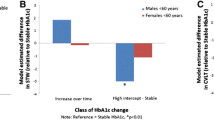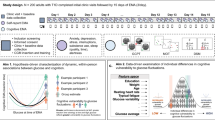Abstract
The ability to control the levels of blood glucose was related to mood and cognition. 155 adults, aged 45–85 years, without a diagnosis of diabetes, were given an oral glucose tolerance test and cognitive tests. Participants were classified according to age (41–60/61–85 years), whether they had better or poorer glucose tolerance and whether blood glucose did or did not fall below baseline values. There were two main findings. Those with poorer glucose tolerance forgot more words and had slower decision times, but only if 61 years or older. Secondly as there are reports in animal studies that inducing low levels of blood glucose values benefited cognitive performance, for the first time in humans, individual differences in the tendency to develop low levels of blood glucose were considered. In those with poor glucose tolerance a tendency for blood glucose to fall below baseline values was associated with better mood and faster working memory.





Similar content being viewed by others
Abbreviations
- LBG:
-
Low blood glucose
- GT:
-
Glucose tolerance
References
Ahmadpour S, Kabadi U (1997) Pancreatic α-cell function in idiopathic reactive hypoglycaemia. Metabolism 46:639–643
Awad N, Gagnon M, Desrochers A, Tsiakas M, Messier C (2002) Impact of peripheral glucoregulation on memory. Behav Neurosci 116:691–702
Benton D, Parker PY, Donohoe RT (1996) The supply of glucose to the brain and cognitive functioning. J Biosoc Sci 28:463–479
Biessels GJ, Deary IJ, Ryan CM (2008) Cognition and diabetes: a lifespan perspective. Lancet Neurol 7:184–190
Boado RJ, Pardridge WM (1993) Glucose deprivation causes posttranscriptional enhancement of brain capillary endothelial glucose transporter gene expression via GLUT1 mRNA stabilization. J Neurochem 60:2290–2296
Bright P, Jaldow ELI, Kopelman MD (2002) The National Adult Reading Test as a measure of premorbid intelligence: a comparison with estimates derived from demographic variables. J Int Neuropsychol Soc 8:847–854
Brun JF, Fedou C, Mercier J (2000) Postprandial reactive hypoglycaemia. Diabetes Metab (Paris) 26:337–351
Chan DW (1985) The Chinese version of the General Health Questionnaire: does language make a difference? Psychol Med 15:147–155
Convit A (2005) Links between cognitive impairment in insulin resistance: an explanatory model. Neurobiol Aging 26(Suppl. 1):31–35
De Feo P, Gallai V, Mazzotta G, Crispino G, Torlone E, Perriello G, Ventura MM, Santeusanio F, Brunetti P, Bolli GB (1988) Modest decrements in plasma glucose concentration cause early impairment in cognitive function and later activation of glucose counterregulation in the absence of hypoglycemic symptoms in normal man. J Clin Investig 82:436–444
Donohoe RT, Benton D (2000) Glucose tolerance predicts performance on tests of memory and cognition. Physiol Behav 71:395–401
Fruehwald-Schultes B, Born J, Kern W, Peters A, Fehm H (2000) Adaptation of cognitive function to hypoglycaemia in healthy men. Diabetes Care 23:1059–1066
Kaplan RJ, Greenwood CE, Winocur G, Wolever TM (2000) Cognitive performance is associated with glucose regulation in healthy elderly persons and can be enhanced with glucose and dietary carbohydrates. Am J Clin Nutr 72:825–836
Lamport DJ, Lawton CL, Mansfield MW, Dye L (2009) Impairments in glucose tolerance can have a negative impact on cognitive function: a systematic research review. Neurosci Biobehav Rev 33:394–413
Lobmann R, Smid HG, Pottag G, Wagner K, Heinze HJ, Lehnert H (2000) Impairment and recovery of elementary cognitive function induced by hypoglycaemia in type-1 diabetic patients and healthy controls. J Clin Endocrinol Metab 85:2758–2766
Matthews DR, Holman RR, Bown E, Steenson J, Watson A, Hughes S (1987) Pen-sized digital 30-second blood glucose meter. Lancet 1:778–779
McCrimmon RJ, Deary IJ, Frier BM (1997) Auditory information processing during acute insulin-induced hypoglycaemia in non-diabetic human subjects. Neuropsychologia 35:1547–1553
McNay EC (2005) The impact of recurrent hypoglycaemia on cognitive function in aging. Neurobiol Aging 26:76–79
McNay EC, Gold PE (2001) Age-related differences in hippocampal extracellular fluid glucose concentration during behavioral testing and following systemic glucose administration. J Gerontol A Biol Sci Med Sci 56:B66–B71
McNay EC, Sherwin RS (2004) Effect of recurrent hypoglycaemia on spatial cognition and cognitive metabolism in normal and diabetic rats. Diabetes 53:418–425
McNay EC, Fries TM, Gold PE (2000) Decreases in rat extracellular hippocampal glucose concentration associated with cognitive demand during a spatial task. Proc Natl Acad Sci U S A 97:2881–2885
McNay EC, Williamson A, McCrimmon RJ, Sherwin RS (2006) Cognitive and neural hippocampal effects of long-term moderate recurrent hypoglycaemia. Diabetes 55:1088–1095
Messier C, Tsiakas M, Gagnon M, Desrochers A, Awad N (2003) Effect of age and glucoregulation on cognitive performance. Neurobiol Aging 24:985–1003
Mortby M, Janke A, Anstey K, Sachdev P, Cherbuin N (2013) High “normal” blood glucose is associated with decreased brain volume and cognitive performance in the 60s: the PATH through life study. PLoS ONE 8:e73697
Mosconi L, Brys M, Glodzik-Sobanska L, De Santi S, Rusinek H, de Leon MJ (2007) Early detection of Alzheimer’s disease using neuroimaging. Exp Gerontol 42:129–138
Nelson HE (1982) National Adult Reading Test: test manual. NFER-Nelson, Windsor
Perlmuter L, Shah P, Flanagan B, Surampudi V, Kosman Y, Singh S (2009) Rate of peripheral glucose change during cognitive testing predicts performance in diabetes mellitus. J Diabetes 1:43–49
Polonsky KS (2000) Dynamics of insulin secretion in obesity and diabetes. Int J Obes Relat Metab Disord 24:S29–S31
Scholey A, Harper S, Kennedy D (2001) Cognitive demand and blood glucose. Physiol Behav 73:585–592
Stuart K, Field A, Raju J, Ramachandran S (2013) Postprandial reactive hypoglycaemia: varying presentation patterns on extended glucose tolerance tests and possible therapeutic approaches. Case Rep Med 2013:273957. doi:10.1155/2013/273957
Triplitt CL (2012) Examining the mechanisms of glucose regulation. Am J Manag Care 18:S4–S10
Uehara Y, Nipper V, McCall AL (1997) Chronic insulin hypoglycaemia induces GLUT-3 protein in rat brain neurons. Am J Physiol 272:716–719
Vea H, Jorde R, Sager G, Vaaler S, Sundsfjord J (1992) Reproducibility of glycaemic thresholds for activation of counterregulatory hormones and hypoglycaemic symptoms in healthy subjects. Diabetologia 35:958–961
Warren RE, Frier BM (2005) Hypoglycaemia and cognitive function. Diabetes Obes Metab 7:493–503
Yaffe K, Falvey C, Hamilton N, Schwartz AV, Simonsick EM, Satterfield S, Harris TB (2012) Diabetes, glucose control, and 9-year cognitive decline among older adults without dementia. Arch Neurol 69:1170–1175
Zhao WQ, Chen H, Quon MJ, Alkon DL (2004) Insulin and the insulin receptor in experimental models of learning and memory. Eur J Pharmacol 490:71–81
Acknowledgments
The authors declare that they have no conflict of interest and that the work was not externally funded. We are grateful to the Swansea University for supplying the necessary facilities.
Author information
Authors and Affiliations
Corresponding author
Rights and permissions
About this article
Cite this article
Young, H., Benton, D. The nature of the control of blood glucose in those with poorer glucose tolerance influences mood and cognition. Metab Brain Dis 29, 721–728 (2014). https://doi.org/10.1007/s11011-014-9519-2
Received:
Accepted:
Published:
Issue Date:
DOI: https://doi.org/10.1007/s11011-014-9519-2




